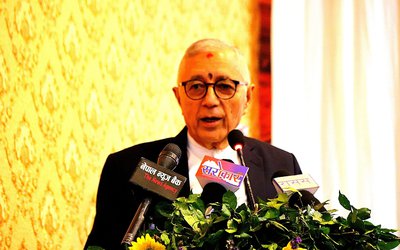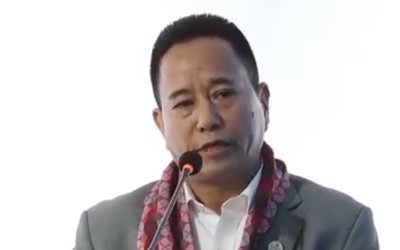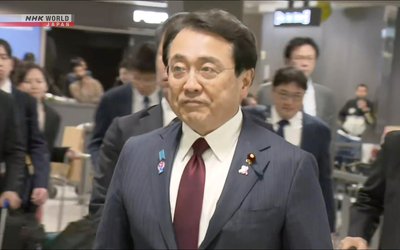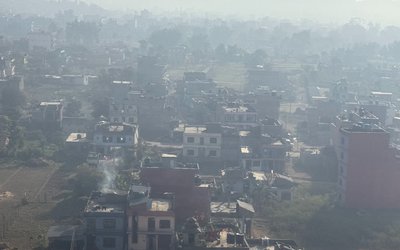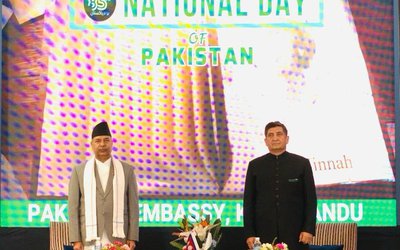
Asian Development Bank (ADB) President TakehikoNakao met with Nepal’s Prime Minister Sushil Koirala, Finance Minister Ram SharanMahat, and National Planning Commission Vice Chairperson GovindaPokharel to discuss ways that ADB can support faster and more inclusive growth in Nepal, notably through better infrastructure and a more skilled workforce. He will also meet Nepal Rastra Bank Governor Yuba Raj Khatiwada on 4 February.
Nakao praised the government’s recent announcement that it will prepare a Nepal Development Vision 2030 strategy and a medium-term development plan to reach middle-income country status. “The strategywill help the government prioritize public investment in key sectors such as energy, transport, and agriculture; improve education, governance, and the business environment; and promote competitive manufacturing industries,” Nakao said. ADB will provide necessary technical assistance to support the planning.
Nakao shared a view with Prime Minister Koirala that democracy is an integral part of economic development. “Nepal’s efforts to strengthen democracy through restoration of peace should make every Nepali very proud.I hope that the new constitution will be enacted soon, paving the way for lasting peace, stability, and economic development,”Nakao said.
Nakao noted that this year marks the 25th anniversary of ADB’s resident mission in Kathmandu. Nepal is a founding developing member country of ADB, which was established in 1966. Since ADB began its development assistance to Nepal in 1969, by funding the improvement of the Kathmandu (now Tribhuvan) International Airport and four domestic airports, ADB has provided 167 sovereign loans and grants to Nepal totaling $4.3 billion.
Nakao commended the government’s ambitious economic reform program to attract private sector investment. He emphasized that effective implementation of these reforms is crucial for Nepal to achieve its economic growth potential of 7%-8% per annum, substantially higher than the 4% average annual rate achieved in the past decade.
ADB forecasts Nepal’s economy to grow at 4.8% in the fiscal year 2015 ending 15 July 2015 and accelerate to 5.2% in fiscal year 2016. The country’s recent macroeconomic stability—underpinned by a low budget deficit of about 2% of GDP, a reduced inflation rate of about 8%, and a balance of payments surplus—would lay the foundations for higher growth.
During his meetings with the country’s leaders, Nakao mentioned that ADB plans to provide about $1 billion in concessional loans and about $13 million in technical assistance grants to Nepal over the next three years. More than 80% of ADB’s financial support is earmarked for major infrastructure projects in hydropower generation and transmission, international airport expansion, road transport and trade facilitation, urban development in key municipalities, education and skills development, and agriculture productivity growth.
Nakao stressed that ADB is committed to helping close Nepal’s power deficit, notably by supporting tariff reform, improving the institutional capacity and financial health of the Nepal Electricity Authority, and strengthening the sector’s regulatory framework. ADB will help the government attract private sector investment and public-private partnerships for large-scale hydropower and transmission projects.
Nakaonoted that Nepal’s public capital expenditure disbursed in recent years had been a low 3.3% of GDP compared to the 8.5% required to fill the infrastructure gap within a decade. “Each year about 20% of the allocated capital budget is underutilized, meaning the country needs to build its fundamental capacities for project development and implementation, assemble a set of ready-to-implement projects, and improve budgetary processes for timely approval and fund release,” Nakao said.
In addition, Nakao highlighted the need to redouble efforts on human resource development. Currently, only 12% of students enrolled in primary school complete the 10th grade. Creating a labor force with better education and skills will be the focus of the next phase of ADB’s School Sector Program, implemented in partnership with other development partners.
ADB, based in Manila, is dedicated to reducing poverty in Asia and the Pacific through inclusive economic growth, environmentally sustainable growth, and regional integration. Established in 1966, it is owned by 67 members – 48 from the region.
- NEPAL-THAILAND: Joint Business Council
- Apr 13, 2025
- BIMSTEC SUMMIT: Nepal’s Stand
- Apr 11, 2025
- IME GROUP: Expands Into Paper Industry
- Mar 24, 2025
- CPN UML: Instigated By India
- Mar 23, 2025
- ADB’S CHIEF ECONOMIST: Nepal Reduces Poverty
- Mar 11, 2025




